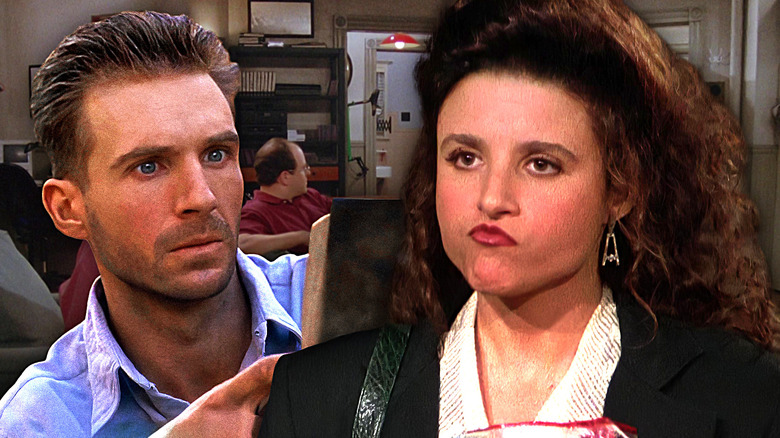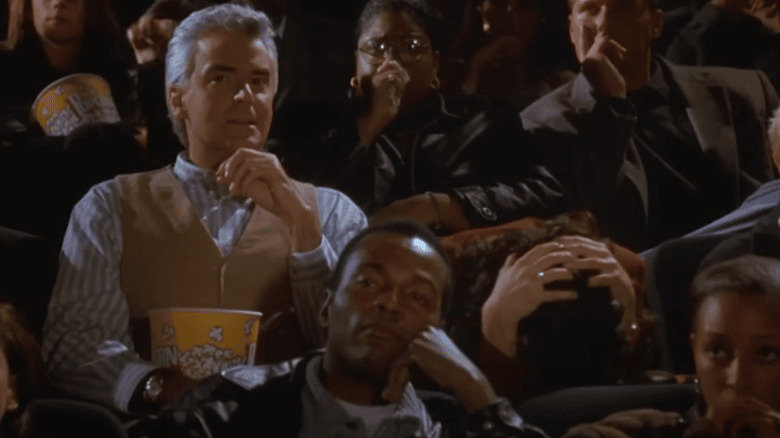
Static Media
One of the most memorable episodes of "Seinfeld" is named after the grand love story "The English Patient," which would go on to win the Best Picture Oscar a few weeks after the episode's airing on March 13, 1997. "Seinfeld" is known for finding humor in the small, ordinary things like disliking a movie and not understanding why it's so beloved. Everyone seems to love "The English Patient" — Elaine's boyfriend (who dumps her for disliking it), her friends, and even her boss who insists on taking Elaine after she lies about not having seen it. The World War II-era blockbuster is about a plane crash survivor with a burned face who recovers at a picturesque Italian monastery. While a kind nurse cares for him and tries to discover his forgotten identity, flashbacks reveal his passionate affair with a married Englishwoman.
For the 20th anniversary of "The English Patient," Vanity Fair wrote an oral history of the "Seinfeld" episode. Episode writer Steve Koren recalls that a fellow writer, Peter Mehlman, was discussing "How, like, you can be dating a person, and if you tell them about a favorite movie of yours and they haven't seen it or they don't like it, it can be a big deal. It can really stick in your mind." This makes me think of that quote from "High Fidelity": "What really matters is what you like, not what you are like." So many of our connections with others are made from similar tastes in books, music, or movies. Koren notes that the idea of "a movie as a means of conflict in a relationship just struck everyone as really funny." But why "The English Patient" specifically? What was it about the award-winning epic that made it such an easy target for "Seinfeld"?
A stupid story about the stupid desert

NBC
During the 1990s, large-scale romances like "Braveheart," "The Last of the Mohicans," "Dances With Wolves," and "Titanic," were extremely popular. With huge production values, vast locations, exciting action sequences, and tragic stories of couples torn apart by historical events, these types of movies were designed to be crowd-pleasers. But Koren explains the "Seinfeld" writers were not blown away by their "sweeping nature," and "The English Patient" seemed overhyped:
It seemed to be like it was revered. Everyone was saying it was just so incredible, if I recall. I sort of came out and I appreciated it, but it didn't affect me like everyone else.
Elaine calls out specific flaws, such as the couple sharing a bathtub. "Gimme something I can use!" she famously shouts. Even though they don't actually have sex in there, Elaine is still frustrated by the nonrealism of the moment. It's the kind of framing that looks good on camera but feels silly in real life. Elaine also complains about the film's nearly three-hour length, which her hatred probably made feel longer. These historical dramas often err on the longer side to encompass decades' worth of storytelling.
Elaine's erratic outbursts always make for great comedy, and Julia Louis-Dreyfus makes her disdain for "The English Patient" feel natural and fiery. Elaine is definitely not the type of woman to buy into this tender and overwrought love story. No matter how much chemistry Ralph Fiennes and Kristin Scott Thomas have, or how majestic the shots of the Sahara are, she'd rather watch "Sack Lunch" — which seems like a casual, 90-minute comedy. The fact that a woman, typically the target demographic for doomed romances, is giving "The English Patient" the middle finger is what makes this episode so funny.









 English (US) ·
English (US) ·